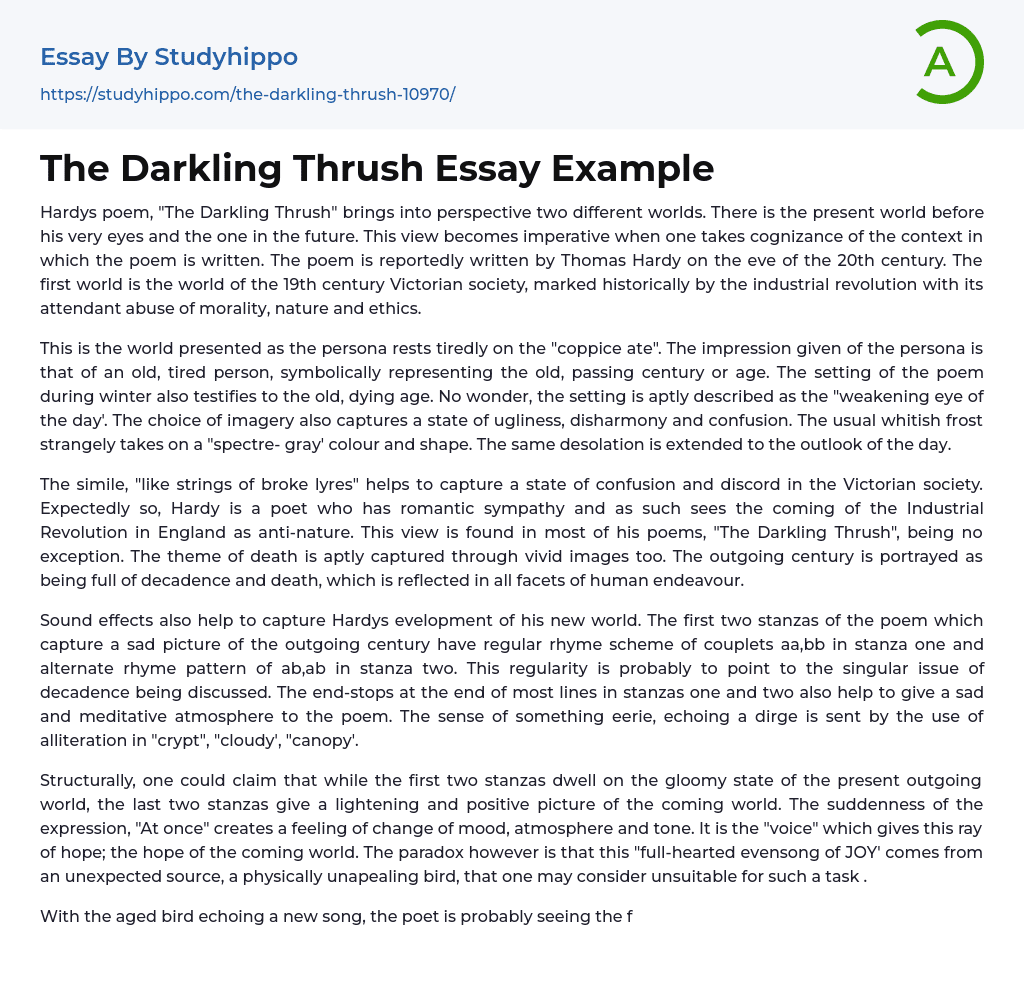Hardys poem, "The Darkling Thrush" brings into perspective two different worlds. There is the present world before his very eyes and the one in the future. This view becomes imperative when one takes cognizance of the context in which the poem is written. The poem is reportedly written by Thomas Hardy on the eve of the 20th century. The first world is the world of the 19th century Victorian society, marked historically by the industrial revolution with its attendant abuse of morality, nature and ethics.
This is the world presented as the persona rests tiredly on the "coppice ate". The impression given of the persona is that of an old, tired person, symbolically representing the old, passing century or age. The setting of the poem during winter also testifies to the old
..., dying age. No wonder, the setting is aptly described as the "weakening eye of the day'. The choice of imagery also captures a state of ugliness, disharmony and confusion. The usual whitish frost strangely takes on a "spectre- gray' colour and shape. The same desolation is extended to the outlook of the day.
The simile, "like strings of broke lyres" helps to capture a state of confusion and discord in the Victorian society. Expectedly so, Hardy is a poet who has romantic sympathy and as such sees the coming of the Industrial Revolution in England as anti-nature. This view is found in most of his poems, "The Darkling Thrush", being no exception. The theme of death is aptly captured through vivid images too. The outgoing century is portrayed as being full of decadence and death, which is reflected in all facet
of human endeavour.
Sound effects also help to capture Hardys evelopment of his new world. The first two stanzas of the poem which capture a sad picture of the outgoing century have regular rhyme scheme of couplets aa,bb in stanza one and alternate rhyme pattern of ab,ab in stanza two. This regularity is probably to point to the singular issue of decadence being discussed. The end-stops at the end of most lines in stanzas one and two also help to give a sad and meditative atmosphere to the poem. The sense of something eerie, echoing a dirge is sent by the use of alliteration in "crypt", "cloudy', "canopy'.
Structurally, one could claim that while the first two stanzas dwell on the gloomy state of the present outgoing world, the last two stanzas give a lightening and positive picture of the coming world. The suddenness of the expression, "At once" creates a feeling of change of mood, atmosphere and tone. It is the "voice" which gives this ray of hope; the hope of the coming world. The paradox however is that this "full-hearted evensong of JOY' comes from an unexpected source, a physically unapealing bird, that one may consider unsuitable for such a task .
With the aged bird echoing a new song, the poet is probably seeing the future as one where there is cooperation and alliance between old and new values. The voice of the bird also adds an element to the new world. It would not be a world built on the superficiality of the Victorian Age, but one built on the creative efforts of a creature like the bird. This probably creates
a picture of given human face to scientific advancements through creative arts. A world where humanness would be written on all "terrestrial things".
These last two stanzas hange the atmosphere to a positive one. This explains the predominance of enjambment to create a sense of excitement and hope envisaged in the approaching Tuture. However tne skeptlclsm expressed Dy tne persona contlnues Ill t tne last line of the poem. Though there is a new experience of hope, yet his other senses think otherwise. He however tries to create a sense of hope which though he may not wholeheartedly share and even goes beyond him, is still ever -present. Though the poem starts on a pessimistic note but to a large extent, ends optimistically.
- Boo Radley essays
- Genesis essays
- Richard iii essays
- Alice in Wonderland essays
- On the road essays
- Ozymandias essays
- The Nightingale essays
- Holden Caulfield essays
- Animal Farm essays
- 1984 essays
- A Hanging essays
- Shooting An Elephant essays
- A Tale Of Two Cities essays
- Adventures Of Huckleberry Finn essays
- Arthur Conan Doyle essays
- Brave New World essays
- Characters In Hamlet essays
- Characters In Romeo And Juliet essays
- Desdemona essays
- Diary Of A Wimpy Kid essays
- First-Person Narrative essays
- Frankenstein essays
- Heart Of Darkness essays
- Jane Eyre essays
- Jay Gatsby essays
- King Duncan essays
- Librarian essays
- Little Red Riding Hood essays
- Lord Of The Flies essays
- Silas Marner essays
- The Cask Of Amontillado essays
- The Catcher In The Rye essays
- The Crucible essays
- The Handmaid's Tale essays
- The Reader essays
- Virgil essays
- Wuthering Heights essays
- Candide essays
- Castle essays
- J. D. Salinger essays
- Ulysses essays
- Ethan Frome essays
- In Cold Blood essays
- Outliers essays
- Tuesdays With Morrie essays
- The Art of War essays
- Wife of Bath essays
- Huckleberry Finn essays
- The Lady With The Dog essays
- Great Expectations essays




